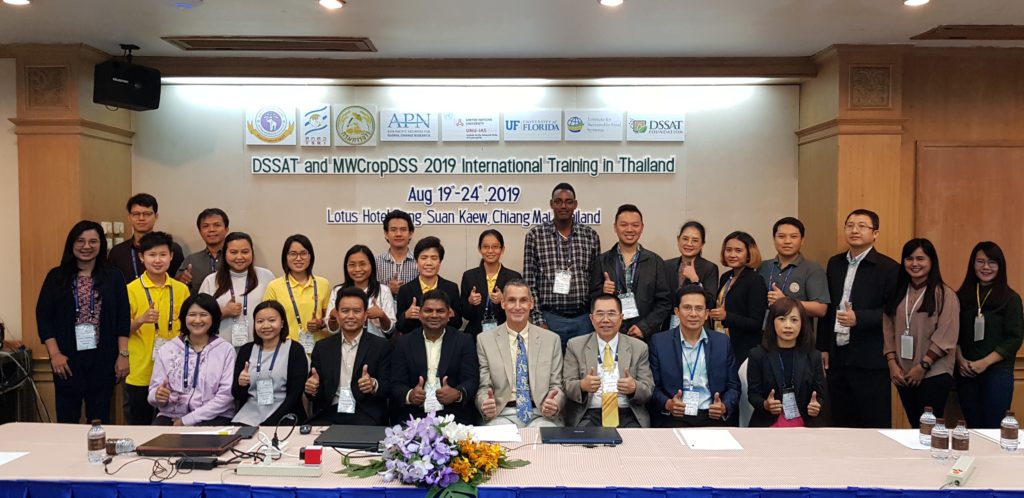The DSSAT and MWCropDSS 2019 International Training Program entitled “Efficient and precision agricultural resource utilization under changes with simulation models and GIS” was successfully held from August 19 through August 24, 2019 at Chiang Mai University in Chiang Mai, Thailand. This workshop was jointly presented by Chiang Mai University, The University of Florida, and the DSSAT Foundation. The overall goal of the workshop was to gain a better understanding of simulation models in predicting relationships of agricultural resources, i.e., water and nitrogen under various weather and climate conditions, on crop phenology and growth.

Participants
We have a total of 20 high quality and eager to learn participants, fourteen females and six males. One male each from Ethiopia and Singapore, eighteen were from Thailand. The APN-UNU project under recommendation of Assoc. Prof. Dr. Geetha Mohan of UNU, Tokyo, Japan provided registration fee for fifteen Thai participants. Fourteen from Thailand Rice Department (ten females and four males) and one female from Department of Agriculture). Three female Thai participants were self-funded, two from the Land Development Department and one from Kasetsart University.
Timetable
August 19-24, 2019 at Lotus Pang Suan Kaew Hotel, Chiang Mai.
Planned timetable:
Day 1: Introduction & Potential Crop Production
Day 2: Weather and Crop Genetic Coefficients
Day 3: Water-limited Crop Produciton and Soils data
Day 4: Nitrogen-limted Crop Produciton and Experimental data
Day 5: Evaluating Risk and Sustainability applications
Day 6: Sequential and Spatial applications
Our Learning
The learning environment was organized by teams before and during the workshop. During the six-day workshop, the participants received soft and hard copies of a series of well-documented training materials, book, software tools, lectures, computer exercises and references. The learning process was supported by six instructors from Japan, Thailand and the USA.
Day 1-4 participants were very patience and followed the planned and original timetable, but slightly behind on some topics. Our days started at 0815AM and finished at 0600PM. They looked a bit tried after Day 2, but always on-time, ready and happy and helping each others to learn.
Towards the end of Day 5, the participant from Ethiopia, with a big smile of his face, commented that ‘This is a simulation exercise of real life situation’, after Prof. Dr. Gerrit Hoogenboom has completed his explanation of the Seasonal Analysis exercise handout. However, we continued the exercise for the whole morning hours of Day of Day 6.
Our Closing
Most Thai participants suggested that the future workshops for Thai participants must be conducted in Thai language. The DSSAT manuals and the exercise must be in Thai language. They also suggested a series of workshops for beginner, intermediate, and advanced levels should be organized.
Some participants suggested that a dynamic model and user interface on other plant nutrients, pests and climate change studies should be further developed. This could be implemented through the Public-Private Partnership scheme.
All participants expressed their willingness to encourage their colleagues to learn the tools and will design their field experiments based on DSSAT manuals. They are also will contribute their data sets to the system.
Next step
To promote collaboration and partnership to contribute resources to deploy and develop tools to meet local needs, participants suggested that both virtual and physical networking activities must be deployed at the national and regional levels. At the national level, the Rice Department of Thailand will officially establish a working group to develop Thai language materials and organize local workshops to expand the network and create awareness of these tools in addition to the traditional tools in agricultural science and innovation.
The upcoming event at the regional level may be co-organized during July 14-17, 2020 in Thailand to host DSSAT users from Cambodia, Indonesia, Laos, Thailand and Vietnam. The main aim is to provide a platform for participants to work on their data sets suitable for DSSAT model calibration and evaluation. The case study can be formulated to use the model(s) to gain better understandings of local situations and predict possible results of various crop production options, subsequently, resources can be co-allocated to improve the situation efficiently and sustainably.
More information:
https://www.carsr.agri.cmu.ac.th/training/dssat2019/
Reported by Attachai Jintrawet
